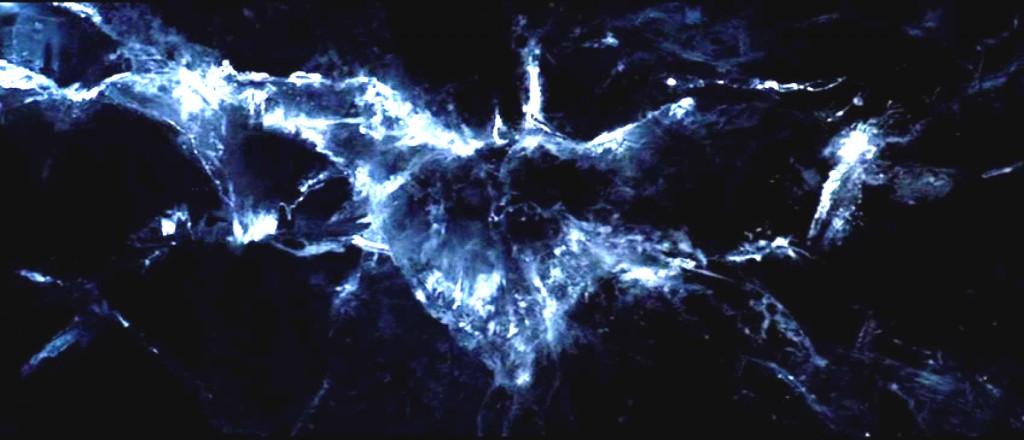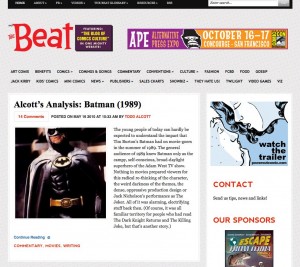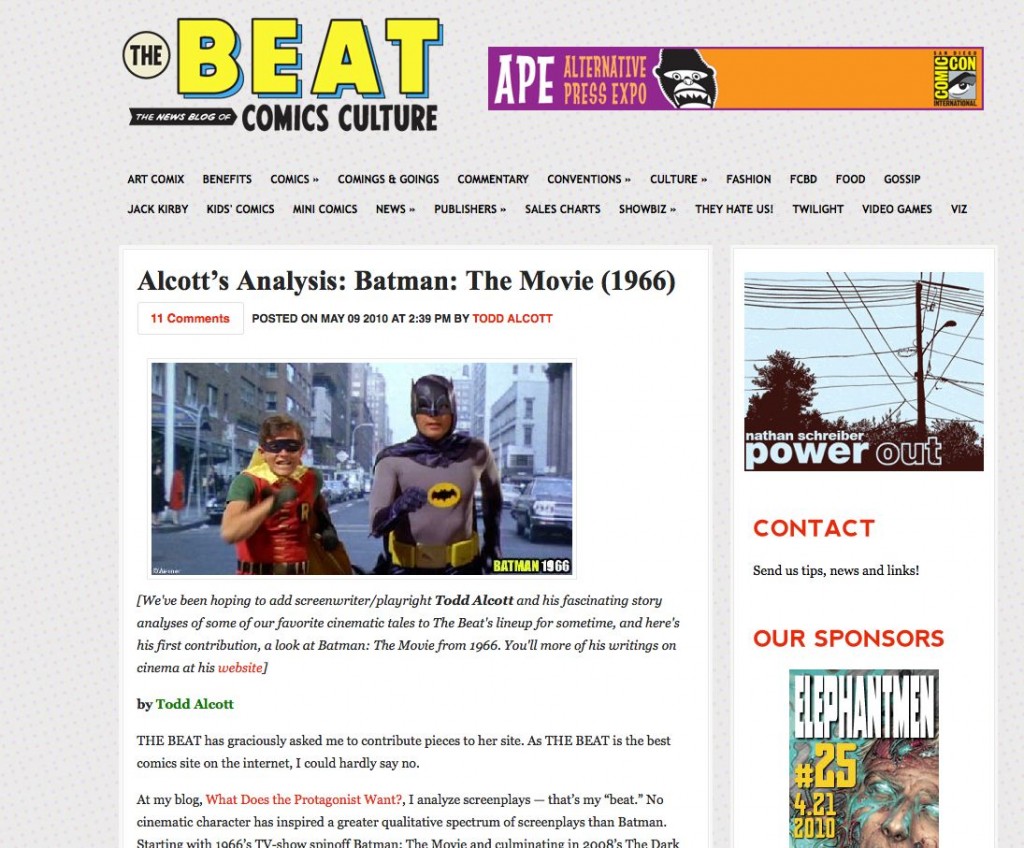Batman: The Dark Knight Rises part 1
The “titles” of Batman Begins showed the symbol of a bat formed in a swarm of bats, the titles of The Dark Knight showed it in fire, now The Dark Knight Rises shows it in ice. The bats in Begins were a symbol of fear, the titles a metaphor for an identity forming out of shadows. The fire of The Dark Knight was like a wall of fire for that bat, that symbol, pushing through the chaos inflicted by the Joker. Now, the bat is, literally, the cracks in the ice formed by the isolation of Gotham City at the hands of Bane. “I knew Harvey Dent,” Jim Gordon lies, as the title image gives way to a scene of Gordon addressing a memorial service for the late District Attorney, “I believed in Harvey Dent.” Gordon is not speaking of Dent at all but of Batman, the man who (the reader will recall) took responsibility for Dent’s bizarre chance-induced crimes, became Gotham’s Dark Knight so that Dent could remain its White Knight, its Daytime Batman as it were. Thus caught up, the viewer is plunged into a new story.
some thoughts on Green Lantern
The big news in Hollywood this weekend is that Green Lantern “failed,” bringing in “only” $52.6 million. “Only,” here, refers to gross-to-expectation ratio.
The reviews were scathing, and when I took my son Sam, 10, to see it on Saturday afternoon, I was fully expecting to see a movie that is thin, noisy, incoherent, poorly plotted, silly and preposterous.
I was pleasantly surprised to find that the movie is none of those things. Rather, it’s entertaining, fast-moving, articulate, and very faithful to its source material. If you are curious about the character and concept of Green Lantern, you will find no better introduction than this movie.
Is it perfect? No, it’s not. But, for some reason inherent to the genre, I find that very few superhero movies are. A movie like the original Spider-Man, for instance, I kind of have to push through the plot and character problems and take it for what it is before I can enjoy it, and then it’s very enjoyable. I can’t think of a single superhero movie, except perhaps The Dark Knight, that really stands up to simple tests of plot, character, motivation, chronology, plausibility, etc.
(Having worked on a number of superhero projects, I speak from experience — they’re really hard to get right, to keep all the elements in line and all the balls up in the air. A contemporary working screenwriter can only watch The Dark Knight from a position of awe.)
Why did the critics hate Green Lantern? I can’t say for sure, but I think it’s a matter of fashion. Marvel has done extremely well for itself presenting a brand of “grounded” superheroes, superheroes who work within a realistic, nuts-and-bolts world that people can recognize. “Grounded,” in fact, has become a buzzword around Hollywood, a town that loves buzzwords, that clings to buzzwords like magical talismans. Iron Man is “grounded,” and so now all movies, especially fantasy movies, must also be “grounded.”
Green Lantern, on the other hand, is not “grounded.” It asks us to buy, before the movie even starts, the concept of an intergalactic police force staffed by goofy-looking aliens and overseen by a bunch of ancient blue guys with see-through skulls who watch over the entire universe.
To a Green Lantern fan, this “buy” is easy — well of course the Green Lantern Corps exists, that’s what the whole thing is about. But to the average non-geek moviegoer, the response is, most likely, “Are you kidding me?”
Think about this:
Nine years ago, The Onion ran this editorial: “When You Are Ready to Have a Serious Conversation about Green Lantern, You Have My E-Mail address.” The piece, a classic, not only perfectly captures a certain type of comics fan, but also perfectly reflects what the average walking-around Joe knows about Green Lantern, which is: who cares?
Now, as if by magic, there is a $200 million movie based on Green Lantern, with a huge marketing campaign and all its attendant pomp and flourish.
(The Onion, not a publication to drop the ball, does it again with this lovely bit of video reporting.)
The fact is, Green Lantern is a hard character for the average moviegoer to “get.”
Why? Because Green Lantern isn’t a character, it’s a job. There is no audience response to the phrase “Green Lantern” because there isn’t any specific guy who is Green Lantern. Clark Kent is Superman, and Bruce Wayne is Batman, Tony Stark is Iron Man, but no one in particular is Green Lantern. My own son, who has no trouble with the concept, only really knows John Stewart as Green Lantern from Bruce Timm’s brilliant Justice League shows. It’s like WB made a $200 million movie called Intergalactic Beat Cop. Who would see that movie, without knowing who the character was? They didn’t make a movie called Hal Jordan: Green Lantern, they made a movie called Green Lantern and showed, on all the marketing, that this is a movie about a job, a job with thousands of other employees, with a headquarters in outer space.
That, in my opinion, is why Green Lantern underperformed this weekend. In order to sell the Green Lantern concept, you have to get the audience to understand that this is not a movie about “Peter Parker, who gets bitten by a radioactive spider and thus becomes Spider-Man.” Rather, you have to get the audience to buy the idea that there is a job, out there, somewhere, called Green Lantern, and this is the story of Hal Jordan, who gets called to fill an opening in that job.
That doesn’t sound like that much for an audience to buy, but that is what happened — the idea that Green Lantern isn’t a guy but a job make Green Lantern a tough sell for civilians. I should know, I’ve encountered this exact same problem in my own life. Sitting down to discuss superheroes with non-initiates, everyone knows who Batman is, everyone knows who Superman is, everyone knows who Wonder Woman is, everyone knows who Spider-Man is, but when you bring up Green Lantern, they draw a blank — there is no character there. And when it comes time to part with $35 for a 3D movie, the average couple will go for something they “know” over something they do not.
New Batman piece up at The Beat
My piece on Tim Burton’s ground-breaking 1989 Batman is up at The Beat. Due to The Beat’s recent flame-discouraging policy, response has been much more sober and respectful this time around.
What Does The Beat Want?
It’s been a big internet week for me. First, I launched this new blog (if you haven’t switched your Livejournal bookmarks, do so now!) Then, out of nowhere, someone I’ve never even met made this smashing video out of a monologue I wrote 20 years ago, and it’s caught on like internet wildfire. And now, my good friend Heidi McDonald at The Beat has started re-posting some of my earlier comics-movies-related analyses, starting with my look at 1966’s Batman: The Movie.
This is the first time one of my blog pieces has been re-posted in another forum, but the reviews are in and readers are ecstatic!
“You are a complete idiot!” – vlucca
“Although I wouldn’t level the charge of “idiot” as vlucca does,I would say ‘misguided’ or “sloppy.'” – S. Chapman
“This so-called “analysis” … seems to have missed the mark entirely!” – KET
“This isn’t so much analysis as it is a badly-written review of a film that the reviewer obviously doesn’t understand or appreciate!” – John
Superheroes: Batman Begins part 2
Yesterday I laid out the basic structure of Batman Begins. And while structure, as any screenwriter knows, is the name of the game for a successful screenplay, it is not the only thing that makes Begins such a detailed, well-considered movie.
Assuming the reader is already familiar with the structure, here are some observations I have in chronological order:
Superheroes: Batman Begins part 1
WHAT DOES THE PROTAGONIST WANT? Bruce Wayne, orphaned at eight, wants to overcome his fears and honor his father. This turns out to be rather more complicated than he suspects.
Batman Begins presents a radically new vision (for the movies, anyway — this stuff had been around the comics and the animated series for many years beforehand) of the Batman story, grounds it in a startling new sense of reality, presents not just a caped crusader and a wacky new villain but a whole wealth of good guys and bad guys, all following their stars in increasingly complex and interconnected ways, all of it bound together with the one fantastic conceit of a young billionaire who dresses up like a bat. It strongly reminds me of the Casino Royale re-boot, which brought the James Bond character to a new level of immediacy while retaining enough of the series’ fantastic hallmarks to still qualify as escapism. There is still enough silliness in Batman Begins to make it a recognizable "superhero movie" (grand, outsized villains with colorful personalities and an ambitious scheme to destroy an entire city, spectacular action sequences that teeter at the brink of believability, production design that borders upon science-fiction) but it’s presented with a sober, straightfaced earnestness that’s nothing less than shocking after the garish camp of Batman & Robin. The Dark Knight would successfully develop all of Begins‘s good ideas into an even more complex, startling vision of modern urban justice.
Superheroes: Batman & Robin
Contrary to its reputation as a garish, headache-inducing day-glo nightmare, Batman & Robin is, in fact, a sensitive, heartfelt examination of power, frailty, family, humanity’s custody of the earth, the ties that bind and the mysterious ways of the human heart.
Superheroes: Batman Forever
Batman Forever does something that Batman and Batman Returns were unable to do: it makes Batman a proper protagonist, with goals and desires of his own. Not merely reacting to events, Bruce/Batman is after something in Forever. His various allies and antagonists, seductions and betrayals are all thematically consistent and relevant to his struggle. This does not mean that the finished movie is without flaws.
Superheroes: Batman: Mask of the Phantasm
Batman: Mask of the Phantasm is in interesting entry in the world of long-form cinematic Batman stories for a few different reasons. First, it manages to do what the Burton movies were unable to — make Bruce/Batman the protagonist of his own story. Second, it’s primarily a detective story as opposed to an action story. Third, at least half of the story is told in flashback, a parallel-action setup ambitious for a movie thought of as primarily for kids. Lastly, the story it tells is rather emotional and internal — Bruce/Batman broods a lot in this movie, even by his own standards. The action sequences feel perfunctory and tacked-on. The two that come to mind — a truck chase and the explosive finale — are poorly motivated and don’t advance the plot in any meaningful way.

































